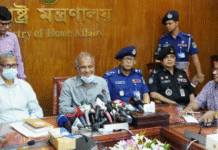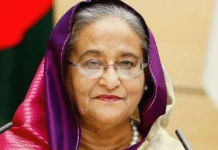
More than 60 per cent of the poor and low-income population who suffered income losses because of the coronavirus-induced economic downturn did not receive any support from the public and private sectors, according to a new survey.
Only 39 per cent of households got some assistance between April and June. But it amounted to 4 per cent of their lost income, said the Power and Participation Research Centre (PPRC) and the Brac Institute for Governance and Development (BIGD) in the study report.
“The support hasn’t been widespread. Besides, the amount and the adequacy of the support have been fairly limited. And the support from the external sources has not been cited [by the respondents] as a very important crisis-coping mechanism because these were not reliable,” said BIGD Executive Director Imran Matin.
He spoke while presenting the report at a webinar organised by the PPRC and the BIGD on Saturday.
The survey was carried out among 7,638 households in an urban slum, rural areas and hill tracts between June 20 and July 2 to analyse the effects of the pandemic on the livelihoods of the poor and vulnerable people, the way they were coping with it and the recovery during the Covid-19 crisis.
“The overall story is that there have been months of low income,” said Matin.
Amid falling income and insignificant external support, the poor and vulnerable people had to depend on savings and cut food consumption. Yet, the non-food expenditure of the poor in urban areas rose because of the deepening burden of house rent and utility expenditure.
And a large number of poor and low-income people had to leave cities because of the income loss and increased non-food expenditure burden.
“Businesses with lower capital are being forced to shut operations,” Matin said.
PPRC Executive Chairman Hossain Zillur Rahman said there was a critical need for a new stimulus package for the micro, small and medium enterprises to be delivered through alternative delivery platforms.
“We have microfinance institutions and other platforms that are more capable of dealing with this sort of clients.”
Noted economist Wahiduddin Mahmud said Bangladesh’s economy was recovering as activities were returning to the pre-Covid-19 period.
“The recovery in Bangladesh is speedy and one of the reasons is Bangladesh’s resilience.”
The revival would depend on how the country supports small enterprises, said the former adviser to a caretaker government.
“Because small enterprises are the most dynamic in Bangladesh’s economy. There has been so much of scaling up,” he said.
A large number of small enterprises closed because of the crisis and these are the enterprises that lost working capital, Mahmud said.
“Replenishing them with working capital is a challenge. Large enterprises will thrive again as a stimulus package is there.”
The study recommended increasing social protections for the urban poor.
Shantayanan Devarajan, a professor of the Practice of International Development at the Georgetown University, said the pandemic may have a long-term effect.
He suggested giving cash support instead of subsidies and kind transfers.
“There is an opportunity to start a universal social protection and strengthen the health sector,” said Fahmida Khatun, executive director of the Centre for Policy Dialogue.
Robin Burgess, a professor of economics and director of the International Growth Centre at the London School of Economics, stressed on training the youth for skill development and providing livelihood and micro-finance support.
Minister for LGRD and Cooperatives Tajul Islam said the pandemic was a very new event for the world and the government tried to provide support despite having constraints.









